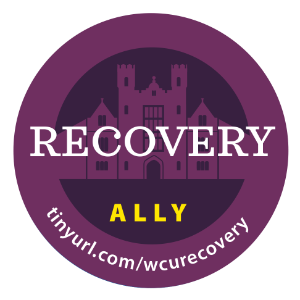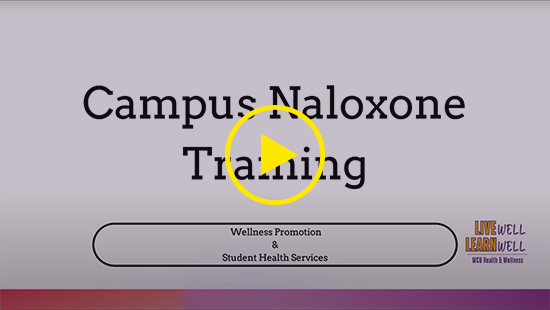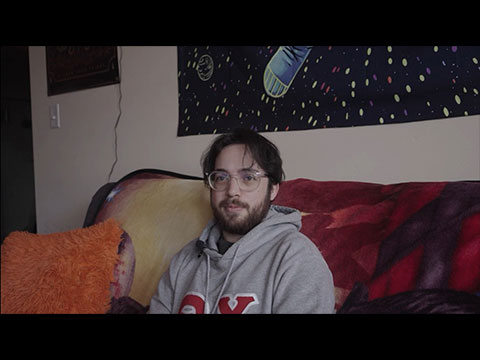Not sure where to start? Check out Ram Resources and the Student Support Center to help locate campus resources and services.
Alcohol and Drug Resources
WCU Medical Amnesty Policy
In order to assure the safety and well-being of students, West Chester University
has established a policy of medical amnesty. WCU holds individual students and student
groups to the same standard. The WCU Medical Amnesty policy has been instituted to
encourage students to seek immediate emergency medical assistance in situations that
are possibly life-threatening such as alcohol or other drug use, and hazing, without
fear of group or individual conduct violations.
For an individual to receive medical amnesty, the bystander seeking assistance must:
- Call 911, Public Safety, Police, Emergency Services, or otherwise contact an other
Authorized University Representative based on a reasonable belief that someone, including
themselves, is in need of medical assistance;
- Reasonably believe that they were the first person to make the 911 call or a call
to Public Safety, Police, Emergency Services, or otherwise contact another authorized
University representative and reported that a person needed immediate medical assistance;
- Provide their own name to the 911 operator, Public Safety, Police Emergency Officer,
University Staff or other authorized University representative;
- Remain with the person needing medical assistance until emergency health care providers
have arrived and taken care of the person in need of medical assistance; and
- Comply with post event educational/counseling objectives issued by the Office of Student
Conduct.
In order for the group and student needing assistance to receive medical amnesty from
the University, the group seeking assistance must:
- Call 911, Public Safety, Police, Emergency Services, or otherwise contact an other
Authorized University Representative based on a reasonable belief that someone, including
themselves, is in need of medical assistance;
- Reasonably believe that they were the first person to make the 911 call or a call
to Public Safety, Police, Emergency Services, or otherwise contact another authorized
University representative and reported that a person needed immediate medical assistance;
- Provide their own name to the 911 operator, Public Safety, Police Emergency Officer,
University Staff or other authorized University representative;
- Remain with the person needing medical assistance until emergency health care providers
have arrived and taken care of the person in need of medical assistance;
- Report this incident to the group’s campus advisor, and affiliated university office,
and
- Comply with post-event educational/counseling objectives issued by the Office of Student
Conduct.
**Student groups that fail to seek immediate medical assistance for members or guests
in need of attention will likely be charged with violations of the Student Code of
Conduct. If found responsible, the student group should expect revocation or suspension
of recognition as the outcome of such violations. It is imperative that student organizations
seek medical assistance for their members or guests in such an emergency situation.**
Students and groups should keep in mind that medical amnesty is not intended to shield
or protect students from other violations of the Student Code of Conduct related to
the incident, or protect students who repeatedly violate the Student Code of Conduct.
Additionally, the University strongly encourages students to report incidents of sexual
misconduct. A witness to or individual who experiences sexual misconduct, acting in
good faith, who discloses any incident of sexual misconduct to University officials
or law enforcement will not be sanctioned under the University’s Student Code of Conduct
for violations of alcohol and/or drug use policies occurring at or near the time of
incident(s) of sexual misconduct.
For additional information on the WCU Student Code of Conduct, visit: https://www.wcupa.edu/_services/wellness/documents/Student-Code-of-Conduct_24-25.pdf
Other Guides
PartySafe ToolKit
T-Break Guide
Mental Health
Counseling & Psychological Services (Counseling Center): Information on individual counseling, group counseling, and psychiatric services
on campus.
CARE Team
Ram Resources
Ask Listen Refer: West Chester University’s online suicide prevention training program designed to
help students, faculty, and staff prevent suicide by identify people at risk for suicide,
recognize the risk factors, protective factors, and warning signs of suicide, and
respond to and get help for people at risk
WCU Mental Health Folding Card
WCU Mental Health Resources
Nutrition Information
WCU Dining Services
Physical Activity and Recreation
Campus Recreation: Find out about campus intramural sports, sports clubs, open recreation facilities,
special sporting events, and outdoor adventures.
WCU Group Fitness/Aerobics: The semester group fitness schedule at the Sykes Fitness Center. You can take as
many classes a week as you want for only $20 per semester or $35 for the year.
Gordon Natural Area: Located around South Campus, the Gordon Natural Area provides a break from campus
life without ever leaving campus. Walk around Gordon alone or on a guided tour, or
cross the road to the Golden Ram Recreational Trail!
Sexual Health
Student Health Services: Learn about the sexual health services offered on campus.
Sexual Health Resources at WCU
Social Justice
Dowdy Multicultural Center
Office of Equal Opportunity and Compliance
Office of Educational Accessibility
The Center for Trans and Queer Advocacy
The Center for Women and Gender Equity
- A-Z topics at Health.gov: The U.S. Department of Health & Human Services provides a collection of information
on over 1,600 health topics.
- Mazzoni Center: Philadelphia's LGBT health care & wellness center.
- The Trevor Project: leading national organization providing crisis intervention and suicide prevention
services
- Mental Health is Health: Learn about the warning signs of depression, find help on your campus, and connect
with others.
- The Steve Fund: Supporting the mental health and emotional well-being of young people of color
- The Trevor Project: The leading national organization providing crisis intervention and suicide prevention
services to lesbian, gay, bisexual, transgender, queer & questioning (LGBTQ) young
people under 25.
- Chester County Parks: With 4600 acres of public park land, Chester County has a park located near you.
Want more options? Be sure to look at State Parks. Bike rental is available at Valley
Forge National Park.
- Chester County and Regional Trails: Information on walking and biking trails throughout the county, region, and beyond.
- West Chester Borough Parks: Learn about the Parks and Recreation Department including upcoming events, parks,
and more
Free Apps for QUITTERS:
- Craving to Quit: a 21 day mindfulness-based program with 2X the quit-rate as other programs!
- Since iQuit: Track how long since you stopped smoking, and money saved.

What is this? You may notice this Recovery Ally sticker around campus. Faculty and staff that have
participated in a training, “Allyship in Recovery: Becoming Recovery-Informed,” will
receive this sticker to identify themselves as an ally and support space for students
who are identifying as being in recovery or seeking information about recovery.
What does recovery mean? The Substance Use and Mental Health Services Administration’s working definition
of recovery from mental disorders and/or substance use disorders is: “A process of
change through which individuals improve their health and wellness, live a self-directed
life, and strive to reach their full potential.” The four major dimensions that support
a life in recovery include:
- Health - overcoming or managing one’s disease(s) or symptoms, such as abstaining from use
or alcohol or drugs, and making informed, healthy choices that support physical and
emotional well-being;
- Home - a stable and safe place to live;
- Purpose - meaningful daily activities, such as a job, school, volunteerism, family caretaking,
or creative endeavors and the independence, income and resources to participate in
society; and
- Community - relationships and social networks that provide support, friendship, love, and hope.
This Recover Ally training was developed by Wellness Promotion with additional support
from the Counseling Center, and was first offered in Spring 2024. For questions or
upcoming training dates, please email wellness@wcupa.edu.
Allyship in recovery: Becoming Recovery-informed
Spring 2026 - Student Training Dates
- Tuesday, February 17th from 3:30 - 5 pm (in person)
- Friday, March 27th from 2 - 3:30 pm (Zoom)
Spring 2026 - Faculty/Staff Training Dates
- Tuesday, February 17th from 1 - 3 pm (in person)
- Friday, March 27th from 9 - 11 am (Zoom)
Learning Outcomes:
- For all attendees: Identify the definitions of and the differences between addiction,
substance use disorder, sobriety, abstinence, sober curious, and recovery
- For students: Understand how to identify warning signs and step in to help someone
else; For faculty/staff: Understand the current campus climate surrounding substance
use and misuse, alcohol and other drug policies, and student perceptions around alcohol
and other drug
- For students: Summarize ways to be a recovery ally as a student on campus; For faculty/staff:
Summarize ways to be a recovery ally in attendee's role on campus
To register, go to https://wcupa.co1.qualtrics.com/jfe/form/SV_2hnt8Fwf7bSEzga.
The following are a list of staff, faculty, and graduate assistants who have completed
the Recovery Ally training.
| Name |
Email |
Title |
| Adriane Reilly |
areilly@wcupa.edu |
Associate Director of Sykes Student Union, Sykes Union and Student Activities |
| Billy Freeman |
wfreeman@wcupa.edu |
Residence Hall Coordinator for Tyson Hall, Residence Life and Housing |
| BK Taylor |
BTaylor3@wcupa.edu |
Assistant Vice President for Health & Wellness |
| Brianna Mazza |
Bm1046510@wcupa.edu |
Residence Life and Housing Graduate coordinator for community standards |
| Bridget Looby |
blooby@wcupa.edu |
Assistant Director, Wellness Promotion |
| Carver Wolfe |
cwolfe@wcupa.edu |
Student Success Coordinator, Academic Support & Advocacy Center |
| Catie Baxter |
cbaxter@wcupa.edu |
Associate Director, Wellness Promotion |
| Claire L. Dente, PhD, LCSW |
cdente@wcupa.edu |
Professor, Undergraduate Social Work |
| Courtney Elgindy |
celgindy@wcupa.edu |
CRNP, Student Health Services |
| Elizabeth Folk |
EF957531@wcupa.edu |
Graduate Hall Coordinator, Residence Life and Housing |
| Elizabeth Hoy |
ehoy@wcupa.edu |
Nurse Practitioner, Student Health Services |
| Jayme Trogus |
JTROGUS@wcupa.edu |
Director, Wellness Promotion |
| Judd Strauss |
JSTRAUSS@wcupa.edu |
Director, Student Health Services |
| Kristin Yeager |
KYeager@wcupa.edu |
Case Manager for CARE Support Services, Office of the Assistant Vice President for
Health & Wellness |
| Lauren Young |
LY924480@wcupa.edu |
Graduate Resident Assistant, Residence Life and Housing |
| Lauren Zahour |
LZahour@wcupa.edu |
Assistant Director of Operations, Office of the Assistant Vice President for Health
& Wellness |
| Lenore Joyce |
ljoyce@wcupa.edu |
RN, Student Health Services |
| Lexie McCarthy |
AMcCarthy@wcupa.edu |
Director, Off-Campus and Commuter Services |
| Michelle Belliveau |
mbelliveau@wcupa.edu |
Professor, Undergraduate Social Work |
| Monica Peta |
mpeta@wcupa.edu |
RN, Student Health Services |
| Nicole Bobbert |
cbobbert@wcupa.edu |
Accounts Payable & Cards System Manager |
| Raina Johnson |
rjohnson3@wcupa.edu |
Student Success Coordinator. Academic Support & Advocacy |
| Sally Lawton |
slawton@wcupa.edu |
Assistant Professor, Political Science |
| Samantha Yothers |
Syothers@wcupa.edu |
Student Success Coordinator, Academic Support and Advocacy |
| Sara Hinkle |
shinkle@wcupa.edu |
Assistant Vice President, Division of Student Affairs |
| Steve Porcelli |
Sporcelli@wcupa.edu |
Residence Hall Coordinator, Residence Life |
| Susan Prince |
SPrince@wcupa.edu |
Career Center Administrative Assistant |
| Veda Maany |
vmaany@wcupa.edu |
Physician, Student Health Services |
PASSHE Video Project
**Content Warning: This video features personal stories containing themes related
to sensitive subject matter, including substance use, sexual assault, grief, and pregnancy
loss.**
A video project from West Chester University, Slippery Rock University, and Shippensburg
University, where three students talk about their journey and relationship with substances.
Video created by Steph Tonneson Media.
Recovery and Support Centers
12-Step Meetings
Al-Anon Meetings
Chester County Narcotics Anonymous Meetings
Start Your Recovery
Rehab After Work: outpatient and intensive outpatient substance abuse treatment in Pennsylvania.
Guadenzia: help for individuals and families affected by drug and alcohol dependency, mental
illness, and related conditions.
Synergy
Have you seen the latest edition of Stall Seat around campus? Stall Seat is the restroom
newsletter produced by Wellness Promotion to connect the campus community with health
and wellness information.
Missed an edition? Check out past editions below.
2025-2026
If you are a staff or faculty member who would like to request to collaborate in an
upcoming edition of Stall Seat, please review additional information about Stall Seat
and submit a request here:
https://wcupa.co1.qualtrics.com/jfe/form/SV_24Eu0QOEWBMvpK6
Please note that we may not be able to include your content in Stall Seat due to competing
requests from other areas on campus, submitted content not aligning with the intent
of the publication, and prioritized content internal to our department.
If you are a campus partner who helps to distribute Stall Seat and have questions
regarding distribution, or there is a change to the contact person, please email us
at wellness@wcupa.edu.




